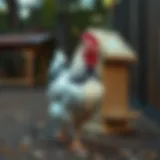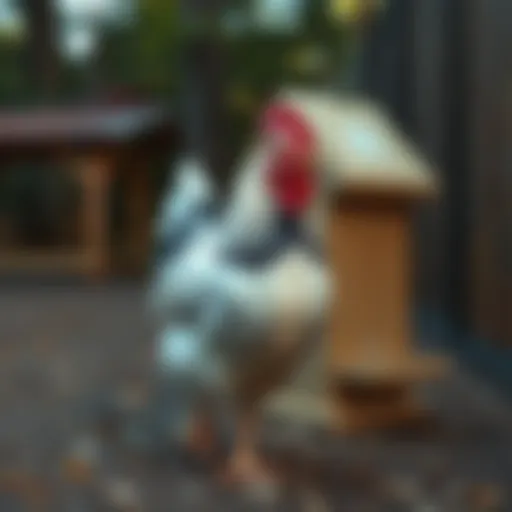Feeding Pet Ducks: Essential Guide to Nutrition
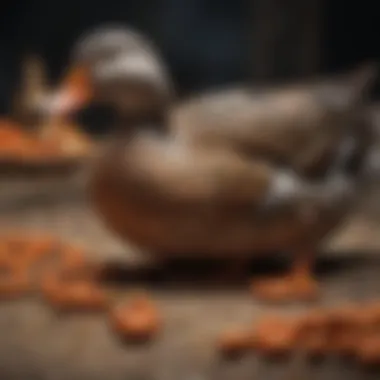

Intro
Feeding pet ducks is a crucial aspect of duck ownership, yet many owners may not fully understand their dietary needs. Proper nutrition is vital for their growth, health, and overall well-being. This guide serves to educate both novice and seasoned duck owners on how to feed their pets effectively, choosing appropriate food options, and ensuring a balanced diet.
Understanding the variety of foods available is essential. Ducks are omnivores, meaning they can eat a wide range of foods. Their diet should include bulk items, such as grains and greens, along with specific supplements. Each aspect of duck nutrition plays a role in their behavior and health, making it important to pay close attention to what and how they are fed.
With proper guidance, owners can cultivate a healthy environment for their ducks. This involves more than just choosing suitable foods; it also requires consideration of hydration, safe feeding practices, and environmental factors that influence their dietary needs. Each section of this guide will address these needs clearly and concisely, aiming to inform and educate, while promoting a thoughtful approach to caring for pet ducks.
Grooming Techniques
While feeding ducks is of utmost importance, grooming also plays a role in their health and appearance. Duck grooming includes basic care that keeps feathers in top condition, promotes good health, and can prevent issues related to cleanliness. Regular grooming is necessary for pet ducks, helping to maintain both their hygiene and comfort.
Basic Grooming Tools
Essential grooming tools for ducks include a few simple items:
- Water for bathing: Ducks enjoy water and require it to keep their feathers clean and waterproof. A kiddie pool or large basin works well.
- Soft brush: A gentle brush can help remove dirt and debris from their feathers.
- Cotton cloth: For drying after a bath or cleaning delicate areas.
Step-by-Step Grooming Guides
- Bathing: Allow the duck to bathe in clean water. This helps them maintain feather waterproofing.
- Brush: After a bath, gently brush the feathers. This can also help spot any potential issues.
- Drying: Make sure to towel dry them if they seem too wet, especially in colder weather.
Breed-Specific Grooming Needs
It's worth noting that different breeds of ducks might have unique grooming requirements. For instance, Pekin ducks may require more frequent bathing than Khaki Campbells, as their feathers can get dirtier due to their size and behavior.
Important: Regular grooming is essential for maintaining healthy plumage and preventing issues such as mold growth and feather rot.
Health and Wellness
Nutrition and Diet Tips
Ducks require a varied diet to thrive. Their food should primarily consist of:
- Special duck feed: This provides the necessary protein and nutrients.
- Fresh vegetables: Leafy greens such as kale, spinach, and lettuce can be great additions.
- Grains: Whole grains like oats, barley, or corn can be included.
Common Health Issues and Solutions
Awareness of common health issues in ducks is essential. Some prevalent problems include:
- Obesity: Overfeeding can lead to obesity, which affects their mobility.
- Feather loss: Nutritional deficiencies can result in feather loss. Ensure they receive enough vitamins and minerals.
Solution: Regular monitoring of their weight and diet adjustments as needed will help maintain their health.
Importance of Regular Check-Ups
Just like any pet, ducks benefit from periodic health check-ups. These visits can help identify health issues early, allowing for prompt treatment. Vets specialized in avian medicine can provide tailored care advice.
Training and Behavior
Basic Training Commands
Training ducks can be rewarding. Simple commands include:
- Come: Using treats, encourage your duck to come to you.
- Stay: Teach them to remain in place using positive reinforcement techniques.
Understanding Common Behavioral Issues
Ducks may display behavioral problems if stressed or improperly raised. Common issues include aggression or excessive quacking. Recognizing these signs can help owners address the root causes early.
Techniques for Effective Training
Positive reinforcement is the key. Offering treats when commands are followed encourages desired behavior. Patience and consistency will yield the best results.
Community Insights
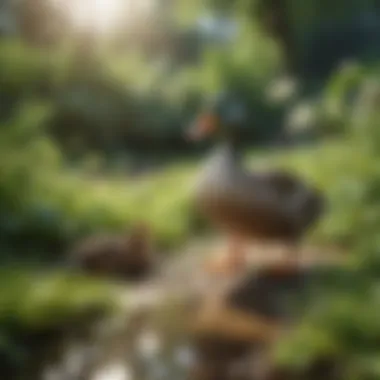

User-Submitted Tips and Tricks
Many duck owners share valuable insights from their experiences. Engaging with communities on platforms like Reddit can provide practical advice tailored to specific situations.
Real-Life Grooming Experiences
Real stories from other duck owners can shed light on best practices and pitfalls to avoid in grooming and care routines.
Expert Guest Contributions
Insights from avian experts can significantly enhance the understanding of duck health and care. Reading materials from veterinary sources, such as the American Veterinary Medical Association, can further inform your practices.
Prelims to Duck Nutrition
Understanding duck nutrition is crucial for those who wish to provide the best care for their pet ducks. A well-balanced diet enhances their health, promotes growth, and ensures they can thrive in a home environment. Ducks, like all animals, have specific dietary needs that can affect their overall well-being. Recognizing these needs will help owners make informed choices about what to feed their ducks, thereby preventing potential health issues later on.
Understanding Duck Digestive Systems
Ducks have a unique digestive system that differs from other domesticated animals. Their digestive tract includes a proventriculus and gizzard, which play critical roles in breaking down food.
- Proventriculus: This glandular stomach starts the digestion process by secreting enzymes and acids that begin breaking down food.
- Gizzard: Following the proventriculus, the gizzard grinds and mixes the feed with digestive juices, facilitating further breakdown.
The duck's anatomy allows it to process a wide variety of food types, including plants and protein sources. It is essential to provide food that aligns with this system for optimal nutrient absorption. A well-functioning digestive system will lead to better health and longevity in ducks.
Key Nutritional Requirements
Ducks require a balanced diet to maintain their health. Key components of their nutritional needs include:
- Carbohydrates: These are the primary source of energy. Ducks frequently consume grains, seeds, and vegetables that provide necessary carbs.
- Proteins: Essential for growth and tissue repair, protein sources can include insects, legumes, and specially formulated duck feeds.
- Fats: Healthy fats should be included in moderation for energy and to support skin and feather health.
- Vitamins and Minerals: These are vital for numerous bodily functions. Calcium and phosphorus are particularly important for bone development and egg production in females.
- Water: While not a nutrient in the traditional sense, adequate hydration is crucial for digestion and overall health.
Providing a mix of these nutrients will help ensure a balanced diet, fostering good health and well-being in your ducks. Owners should regularly assess the diets they provide, especially when changes in behavior or health arise.
Types of Food for Pet Ducks
Feeding pet ducks requires understanding the types of food that best meet their nutritional needs. Ducks are foragers by nature, and their diet should reflect their instinctual behaviors. Providing a variety of food sources can contribute to the overall health, vitality, and happiness of these birds. Proper food choices ensure that ducks receive all the necessary nutrients required for optimal growth and reproduction.
Commercial Duck Feed
Commercial duck feed is formulated specifically to meet the dietary needs of ducks at various life stages. These feeds often contain a balance of carbohydrates, proteins, and fats, along with essential vitamins and minerals. Choosing a reputable brand ensures that the feed meets quality standards and provides adequate nutrition. Brands like Dumor or Purina have options designed for ducks, including grower and layer feeds, which can cater to specific age groups and reproductive needs.
Common forms of commercial duck feed include pellets, crumbles, and mash, each having its benefits. Pellets are convenient and reduce waste, while mash can be easier for younger ducks to consume. However, it's crucial to follow the manufacturer's recommendations regarding feeding quantity and frequency to prevent overfeeding.
Vegetables and Greens
Fresh vegetables and greens are vital for a balanced diet for pet ducks. They add much-needed fiber and essential nutrients. Ducks enjoy a variety of leafy greens like kale, spinach, and romaine lettuce. Root vegetables—such as carrots and beets—can also be included, ensuring they are chopped into manageable sizes. Cruciferous vegetables, including broccoli and cabbage, should be fed sparingly due to their potential to cause digestive issues if given in excess.
When introducing new vegetable items, it's wise to observe how ducks react to different textures and flavors. Fresh produce should be pesticide-free and washed thoroughly to prevent chemical exposure. Diversity in greens aids in stimulating their interest in food and promotes better digestion.
Grains and Seeds
Grains and seeds offer energy and serve as an excellent source of carbohydrates for ducks. Whole grains such as corn, oats, and barley can be beneficial. These items are often welcomed by ducks due to their taste and texture. Seeds like sunflower seeds and pumpkin seeds can be nutritious treats when offered in moderation.
It’s essential to provide only unprocessed grains, as those treated with additives may be harmful. If you choose to feed grains, doing so at appropriate portions is advisable to avoid obesity. While ducks can consume grains, these should not be the sole part of their diet but rather a supplement across different food items.
Protein Sources
Protein is a critical component for the growth and development of non-laying ducks and for egg production in laying females. Mealworms, crickets, and soy products serve as excellent protein sources. These protein-rich foods bolster overall health and enhance feather condition, which is vital for insulation and buoyancy.
Additionally, ducks may enjoy specific pulses and legumes, such as peas and lentils. However, it is imperative to ensure that any protein source is safe and suitable for duck consumption. Giving proteins should be balanced with other food types to maintain a well-rounded diet.
Key Takeaway: A varied diet not only meets the nutritional needs of ducks but also enriches their eating experience and overall well-being.
Feeding Guidelines
Feeding guidelines are crucial for ensuring the health and well-being of pet ducks. Proper guidelines help pet owners understand not only what foods are appropriate, but also how to balance the diet. Ducks require a specific amount of nourishment daily to maintain their energy levels, support digestion, and promote growth. Not adhering to these guidelines can lead to nutritional deficiencies or health problems.
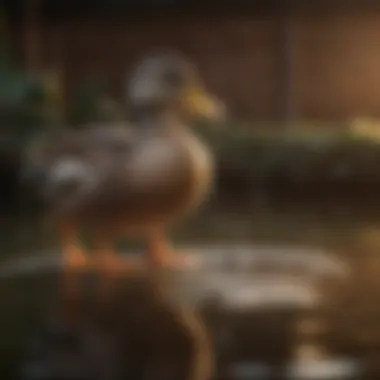

How Much to Feed
When feeding pet ducks, the quantity of food is a vital consideration. Ducks vary in size and age, influencing their dietary needs. Generally, a good rule of thumb is to provide approximately 1/4 to 1/3 of a cup of feed per duck each day. It may be helpful to adjust this amount based on the duck's body weight. Observing the duck’s physical condition will guide you.
- Daily food intake can be divided into main meals across the day.
- Watch for signs of hunger or satiety, as these will inform you about adjustments needed in the portion size.
- Provide additional sources like water and snacks, but ensure these do not replace their main feed.
Feeding Frequency
The frequency of feeding pet ducks is equally important. Ducks benefit from regular feeding schedules, ideally two to three times por day. This routine helps mimic their natural foraging behavior. Feeding at consistent times is beneficial and encourages active eating habits.
- Morning and evening are ideal times for larger meals.
- Offer smaller snacks throughout the day to keep energy levels stable.
- Adjust timing based on individual needs, especially for younger ducks, which might require more frequent feeding.
Age-Specific Dietary Needs
Different growth stages of ducks come with different dietary requirements. Young ducklings have specific needs that transition into the requirements of adult ducks.
- Ducklings (0-8 weeks): High protein feeds, typically 20-22% protein, is essential to support rapid growth.
- Juvenile ducks (8-20 weeks): A balance of protein and grains, around 16% protein, as they prepare for adulthood.
- Adult ducks (20 weeks and older): Adult maintenance feeds, usually less protein, can be around 14% to support health without excessive growth.
Understanding these phases ensures that ducks receive the balanced nutrition they require at each stage of their lives. Adjusting their diet accordingly will result in healthier and more vibrant pet ducks.
Supplementing the Diet
The diet of pet ducks should not rely solely on standard feed. Supplementation is an important aspect of duck nutrition, providing essential vitamins, minerals, and digestive aids that standard feed may lack. Such additions can improve overall health, boost the immune system, and enhance growth and egg production. Various supplements can address specific health concerns and ensure that ducks receive a balanced and varied diet.
Vitamins and Minerals
Ducks require an array of vitamins and minerals for optimal health. Vitamin deficiencies can lead to health issues and affect the duck's performance.
Key Vitamins
- Vitamin A: Important for vision, growth, and immune function. Carrots and leafy greens are good sources.
- Vitamin D: Supports calcium absorption, crucial for strong bones and eggshell quality. Ducks can synthesize it through sunlight or can be found in fortified feeds.
- Vitamin E: Acts as an antioxidant, helping prevent cell damage. Nuts and seeds are excellent sources.
Important Minerals
- Calcium: Essential for bone structure and egg shell formation. It can be found in crushed oyster shells or limestone.
- Phosphorus: Works with calcium to ensure proper bone health. It is present in grains and seeds.
- Iodine: Critical for thyroid function, which regulates metabolism. Seaweed or iodized salt can provide this mineral.
When supplementing, base decisions on the specific needs of your ducks, paying attention to age and activity level. It is advisable to introduce supplements gradually to avoid digestive upset.
Probiotics and Digestive Aids
Probiotics can be beneficial for maintaining gut health in ducks. A healthy gut flora aids in digestion and nutrient absorption. Adding probiotics can help prevent digestive disturbances commonly seen in waterfowl, particularly in young or stressed birds.
Benefits of Probiotics
- Enhances Digestion: Probiotics break down food more efficiently, improving nutrient uptake.
- Boosts Immunity: A healthy gut contributes to a stronger immune system, making ducks more resistant to diseases.
- Reduces Stress: A balanced gut flora can help manage stress during changes in diet or environment.
Sources of Probiotics
- Commercial Probiotic Supplements: Available in powder or pellet form at pet stores.
- Fermented Foods: Plain yogurt or buttermilk can be offered in moderation as natural sources of probiotics.
Giving probiotics can be particularly important during times of stress, such as moving to a new home or after a health crisis. Monitoring your ducks after introducing any supplements is vital to ensure they are adjusting well.
Remember: Always consult with a veterinarian before making significant changes to your duck’s diet, especially concerning supplements.
The integration of vitamins, minerals, and probiotics in the diet of pet ducks promotes long-term health, growth, and resilience, making it a fundamental aspect of their care.
Hydration Needs of Ducks
Maintaining proper hydration is crucial for the well-being of pet ducks. Just like all animals, ducks rely on water not only for drinking but also for their overall health and nutrition. Water supports various bodily functions, including digestion, temperature regulation, and waste elimination. Understanding how to provide clean water and considering environmental factors will ensure that ducks thrive in their home.
Clean Water Sources
Providing access to clean water sources is essential. Ducks often prefer drinking from a shallow pool or bowl rather than a deep one. This behavior allows them to submerge their heads comfortably, mimicking their natural feeding habits. Here are some important criteria for clean water sources:
- Freshness: Water should be refreshed daily to prevent contamination. If ducks are allowed to swim, it's wise to change the water frequently to keep it clear of feces and food debris.
- Size: The water container should be large enough for ducks to dip their heads in and access their beaks. A bowl that can hold at least a gallon is often sufficient for a small flock.
- Material: Use materials that are safe and non-toxic. Common choices include plastic, stainless steel, or ceramic. Avoid metal containers that might corrode or leach harmful substances over time.


Water quality impacts overall health. Contaminated water can lead to digestive problems or infectious diseases. Monitoring water cleanliness is a part of responsible duck ownership.
Considering Environmental Conditions
Environmental conditions play a vital role in a duck's hydration needs. Factors such as temperature, humidity, and the duck's activity level can affect water requirements significantly.
- Temperature: In hot climates, ducks will need more water to stay hydrated. Heat stress can rapidly occur if water is limited. Make sure they have access to water at all times during particularly warm days.
- Humidity: In higher humidity areas, ducks may consume less water, yet still need fresh, clean sources readily accessible.
- Activity Level: Active ducks require increased hydration. Regular exercise is common for ducks, especially if they are foraging or swimming. Always provide water directly after exercise to help replenish lost fluids.
In summary, understanding the hydration needs of ducks is critical for their health. By providing access to clean water and considering environmental factors, pet owners can ensure their ducks remain hydrated and healthy throughout their lives.
Common Feeding Mistakes
Feeding pet ducks may seem straightforward, but several common missteps can lead to health issues. It's essential for owners to understand the implications of their feeding practices. Common feeding mistakes can compromise the well-being of ducks, which can be avoided with proper knowledge and attention.
Overfeeding and Its Consequences
Overfeeding is one of the most prevalent mistakes among duck owners. Ducks have a natural tendency to eat more than their bodies require. While it may be tempting to indulge them, excessive feeding can lead to obesity, which can cause various health issues like joint problems and heart disease. Monitoring portion sizes is critical to prevent these complications.
Additionally, overfeeding can disrupt their natural behaviors. Ducks feed throughout the day in the wild, consuming a diverse range of foods based on availability. By overfeeding, owners may unintentionally reduce the motivation for ducks to forage and engage in their natural instincts.
To avoid overfeeding, a good rule of thumb is to offer only the recommended amount of food based on the duck's weight and age. A precise portion helps maintain a healthy weight. Consider using a feeding schedule that allows for consistent meal times while offering occasion treats in moderation.
“Ducks should always have access to a balanced diet, but understanding their limits will help keep them healthy and active.”
Inappropriate Food Choices
Choosing the wrong foods for pet ducks is another common mistake that many owners make. Ducks have specific dietary needs, and providing unsuitable foods can lead to nutritional deficiencies or even poisoning. For example, bread should be avoided; it has little nutritional value and can lead to health complications such as angel wing, a condition caused by excessive consumption of carbohydrates.
Other foods to avoid include:
- Processed foods: This includes snacks designed for humans that may contain preservatives or harmful additives.
- High-sugar products: Most fruits should be given in moderation. They can be high in sugar, which is unhealthy if ducks consume them regularly.
- Certain vegetables: Foods such as onions and garlic can be toxic to ducks and should not be included in their diet.
Instead, focus on providing a balanced diet that includes appropriate commercial duck feed, fresh vegetables, and grains. Always consult with a veterinarian or a poultry nutrition expert to determine the best feeding practices tailored to your pet ducks' specific dietary needs.
Monitoring Duck Health Through Diet
Monitoring duck health through diet is essential for ensuring the overall well-being of pet ducks. Ducks rely heavily on their diet for not just basic nutrition but also for maintaining a healthy immune system and preventing various health issues. A balanced diet can help owners identify potential problems early, allowing for timely interventions when necessary. Understanding what to look for can make a significant difference in the quality of life for these birds.
Signs of Nutritional Deficiency
Identifying signs of nutritional deficiency in ducks is a critical aspect of monitoring their health. Ducks are generally resilient, but when their diet lacks essential nutrients, symptoms can arise. Here are some indicators to watch for:
- Poor Feather Condition: If a duck's feathers appear dull, brittle, or uneven, it may indicate a lack of essential fatty acids or protein.
- Weight Loss: Significant weight loss or failure to gain weight can signal nutritional deficiencies, possibly indicating an inadequate caloric intake.
- Lethargy: Decreased activity levels can be a sign of various health issues, including inadequate nutrition.
- Changes in Droppings: Abnormal droppings, such as very loose or hard stools, may point to dietary imbalances.
- Weakness or Difficulty Walking: This may suggest deficiencies in vitamins and minerals, particularly calcium or vitamin D.
Regularly observing ducks for these signs allows for prompt action, whether that means enhancing their diet or consulting a veterinarian.
Behavioral Indicators of Health
The behavior of pet ducks can serve as a valuable indicator of their health status. Changes in behavior may often reflect their dietary needs and overall condition. Here are some behavioral signs to consider:
- Vocalization Changes: An increase or decrease in vocalization can indicate stress or discomfort stemming from nutritional issues.
- Social Interaction: Ducks are social creatures; a withdrawal from flock activities may suggest health problems triggered by dietary insufficiencies.
- Grooming Habits: Healthy ducks will regularly preen their feathers. A lack of grooming may signal discomfort or poor health.
- Foraging Behavior: Ducks should actively search for food. A disinterest in foraging may point to dissatisfaction with their current diet.
- Normal Activity Levels: Ducks should be active and engaged. Decreased activity or lethargy can indicate that something is wrong with their diet.
Understanding these behavioral indicators will help owners adjust their ducks' diets as needed. Monitoring dietary impacts on health and behavior enables owners to cultivate a vibrant, healthy flock.
The relationship between diet and duck health is more interconnected than many owners realize. By thoroughly assessing both dietary needs and observable behaviors, one can maintain a robust baseline of health for their feathered companions.
Closure
In the journey of caring for pet ducks, understanding how to feed them is paramount. This article has highlighted essential aspects of nutrition necessary for the health and well-being of these birds. Proper feeding ensures that ducks receive balanced diets and meet their specific nutritional requirements.
Summary of Key Points
Key points from this guide include:
- Diverse Food Types: Providing a mix of commercial feeds, vegetables, grains, and proteins is vital for a balanced diet.
- Feeding Guidelines: Knowing how much and how often to feed ducks contributes significantly to their health.
- Monitoring Health: Observing dietary effects on behavior and health can help in adjusting feeding practices accordingly.
- Continuous Learning: Staying informed about the best practices in feeding ducks helps pet owners make better choices.
Encouragement for Continued Learning
The landscape of animal care is ever-changing. For pet duck owners, this means embracing the responsibility to learn continuously. Resources such as veterinary advice, up-to-date articles, and community forums can provide valuable insights.
Adopting a curious mindset will help you adapt to your ducks' evolving needs over time. Engage with fellow duck owners on platforms like reddit.com or explore informative content on britannica.com. Realizing the significance of a continuous educational approach fosters deeper connections with your pets and enhances their quality of life.




